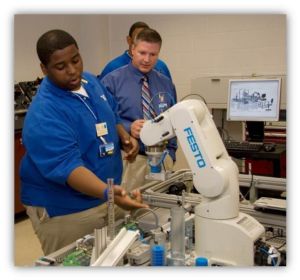
Daniel Horine, principal investigator of two National Science Foundation Advanced Technological Education (ATE) project grants, sees the high demand for mechatronics technicians, who have a combination of mechanical, electrical and computer skills, as evidence of their career opportunities and their importance to manufacturers whose output influences the nation's economic health.
"Mechatronics is thinking about the end in mind and [about] how we are going to integrate these systems from the beginning ... I want mechatronics and the integrated approach to be a way of teaching, and break down the silos and barriers, so that we are setting up our students for success," Horine said.
Horine received the Educator of the Year Award at the High Impact Technology Exchange Conference (HI-TEC) for developing the Mechatronics Systems Engineering Technology associate in applied science degree at Virginia Western Community College (VWCC) in Roanoke, Virginia. At the HI-TEC conference Horine explained that helping other people succeed is the most gratifying aspect of his professional life. "Knowing that I'm helping them have a career so they can provide for their family, that's a pretty noble cause in my opinion," he said.
When Horine is excited he talks fast. And when he talks about the mechatronics engineering technician program he developed at VWCC the conversation moves at an especially quick clip. His official title at VWCC is instructor of automated manufacturing and head of the Advanced Technology in Mechatronics program.
Fifty students are enrolled in the mechatronics degree program at VWCC and another 250 high school students are in the "pipeline" that Horine developed during the Engineering of Engineering Technicians (E2T) project, for which he received an ATE grant in 2012. The pipeline includes a Regional Academy in Advanced Technology that helps the dual enrolled high school students transition to the college's more rigorous academic expectations. The grant also provided professional development to high school and college instructors, and site licenses for educators to access ToolingU-SME online instructional modules.
Advice to Faculty: Talk to Employers & ATE Principal Investigators
Roanoke manufacturers and the South Carolina ATE Center were the key influences of the problem-based curriculum that Horine crafted during the E2T project. He encourages faculty who are interested in improving technician education programs to talk with their local employers and to tap into the resources of the ATE community.
"As an educator we can't know it all. We can't possibly be engaged and connected with every single thing. So we have to ask our industry partners what they need because they are out there every day, facing these battles competing with China and India," he said, stressing the importance of listening to what employers say about the skill gaps they would like colleges to address.
Twelve companies are currently represented on the advisory panel for VWCC mechatronics program. "Since I came from industry, I can talk their language," Horine said, referring to his first career as an automation engineer for a medical device manufacturer. He describes the sustainability plan for his college's mechatronics program as simple: "If industry likes what you do, they are going to want more of your graduates." With about 10 mechatronics students graduating each year, demand continues to exceed supply.
Aside from listening to industrial employers, Horine has also effectively utilized advice from other ATE principal investigators, particularly Elaine Craft and Marilyn Barger.
He was introduced to the ATE community at the 2008 SAME-TEC conference, which he attended on a fellowship from the National Center for Optics and Photonics Education (OP-TEC). In 2009 a larger group of ATE centers took over the conference that seeks to spread ATE innovative practices to colleges and high schools, and renamed it HI-TEC.
Horine credits Craft with helping him work out the kinks in a problem-based curriculum that teaches the multiple disciplines of mechatronics in a sequence that matches the activities of modern workplaces. Craft is principal investigator and director of the South Carolina ATE National Resource Center at Florence-Darlington Technical College in Florence, South Carolina,
Horine calls Barger, executive director and principal investigator of the Florida Advanced Technological Education Center (FLATE), his "most trusted advisor." The stackable credentials in VWCC's mechatronics program are modeled on the statewide engineering technology certificate and degree program that Barger developed for the state of Florida.
Advocating for an engineering technology program is challenging in Virginia where the engineering programs of the University of Virginia and Virginia Polytechnic Institute have wide, name-brand appeal.
VWCC Mechatronics Degree Transfers to Purdue University Calumet
Horine hopes the new articulation agreement between Purdue University Calumet in Hammond, Indiana, and VWCC will show students and parents the value of mechatronics as an alternative path for people who like engineering concepts but do not want to be stuck working at a desk in an office.
The agreement guarantees that 55 credits from VWCC's mechatronics program will transfer to Purdue University Calumet's ABET-accredited bachelor's degree in mechatronics engineering technology. Some core requirements and elective credits are also covered by the agreement. That means VWCC students may transfer with 88 of the 122 credits needed for a Purdue bachelor's degree. The VWCC transfer students will also be eligible for Purdue's College of Technology and industry-sponsored mechatronics scholarships.
Niaz Latif, dean of the School of Technology at Purdue University Calumet, is principal investigator of the Meeting Workforce Needs for Mechatronics Technicians ATE grant that has created mechantronics instructional modules for associate degree programs and high schools in Indiana and Illinois. Latiff says the partnership with VWCC fits with the ATE project's goal of developing course-by-course articulation agreements with two-year colleges.
In August, Horine received his second ATE grant. With this Partnership for Advanced Career Education in Mechatronics Engineering (PACE ME) grant, Horine plans to add apprenticeship experiences for VWCC mechatronics students, a fabrication laboratory for faculty professional development, and more outreach to underrepresented minority students.

 Subscribe
Subscribe


 See More ATE Impacts
See More ATE Impacts

Comments
There are no comments yet for this entry. Please Log In to post one.